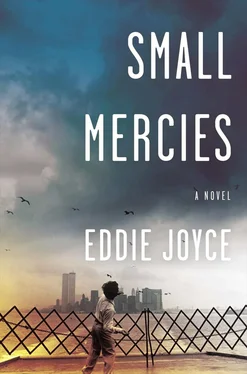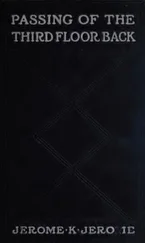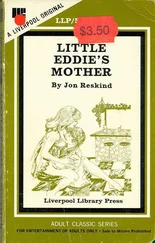“I don’t remember what the case was about, but we were in his office, talking about it. And I say it. OHM-braj. Ned gives me this quizzical look — he had these horn-rimmed glasses and his eyes kinda winced behind them — but he lets it go. But then I say it again. OHM-braj. And he puts his hand up and asks, ‘Peter, what is that word you keep saying, OHM-braj? I’m not familiar with that word,’
“And I say, with confidence, ‘OHM-braj, it means to take offense.’ This wry little smile breaks across his face and he says, as kind as can be, ‘I think the word you’re looking for is umbrage .’”
Gina laughed. Her eyes had regained their twinkle. Dried tears glistened on her cheeks.
“Bad, right? It gets worse. I say to Ned Stone, who I later learn went to Exeter, Harvard, and Harvard Law, who majored in English at fucking Harvard, I say, ‘I’m pretty sure it’s pronounced OHM-braj.’ And Ned Stone, may he rest in peace, God bless him, says, ‘Perhaps you’re right, Peter.’ And then I know, I know that I’m wrong, and Gina, I swear to God, it was like a stitch of me had been ripped away. Like the word was everything that I thought was solid and reliable in the world and it had been pulled away from me. I went back to my office and I sat there and I felt like you feel right now — out of place, over my head, unqualified.”
Her lips quivered in appreciation. He heard a final whisper from the banished voice, muffled and impotent.
The desk, it pleaded, keep the desk between you .
He stood and walked around his desk. He sat in the empty chair next to her. She shifted to face him. He waved to his closed door to indicate the rest of the firm.
“Everyone here isn’t sure they belong here. I’m not sure I belong here and I’m a partner. And the other first-years, your colleagues, believe me, they’re as scared and uncertain and insecure as you are. They might not be showing it, but they are. Trust me.”
He leaned in, lowered his voice. Their faces were closer than they’d ever been. He could see the raw, jagged capillaries in the whites of her eyes, the tiny, inevitable imperfections of her skin. He could smell her.
“The thing is, Gina, some of these kids do have an advantage over you. They grew up with this, their parents did this, they know this world. You don’t, not yet. Your father was a firefighter, same as mine. And your mom, what did your mom do?”
“She worked part-time as a secretary at a dentist’s office. But mostly she raised us.”
Peter nods.
“Exactly. My mom stayed home until Bobby was in high school and then she started teaching. These kids”—he waves his hand toward the door—“their parents were lawyers and bankers and God knows what else. They seem like they belong because they’ve been in this world their whole lives. You haven’t. But you’re just as smart as they are, if not smarter. You just haven’t been prepared for this like some of them have.”
She’d started crying while he spoke. He reached across and took one of her hands between his two. It was warm and soft, he could feel the heat leeching into his own cold, stiff palms.
“But you belong here. You deserve this.”
“Thank you,” she said. She looked down at their conjoined hands. He heard a muffled voice out in the hallway. He realized he’d crossed a line. A handful of lines. But he couldn’t move his hands. He could sense the possible moving toward the preordained, could feel her anticipation matching his, surpassing it even. Her face inched toward his. Over Gina’s right shoulder, he glimpsed the picture of Bobby, head tilted down, almost a nod, and he had the strangest thought, one that settled his mind and cleared his conscience.
We owe the dead our sins.
“Your hands are freezing,” she whispered and she was close now, close enough that he could feel the breath behind her words.
“Cold hands, warm heart,” he said and then he kissed her.
* * *
Peter sits in the back of a yellow cab on the FDR, stuck in the traffic that leads to the Brooklyn Bridge exit. He’s asked the cabbie to get out of the right lane — the sucker’s lane — twice, but the guy won’t budge. He got a ticket last week, he tells Peter, and he won’t risk it. Half the reason you get into cabs is so that they can drive like assholes while you sit guiltless in the back and Peter’s found the one cabbie in the city with a conscience. The cherry on top of a perfect Monday.
All he wants is to revive his fading buzz with a bottle of red wine and then sleep for twelve hours. He’s not going into the office tomorrow. Fuck them.
His cell phone vibrates in his pants pocket. Home.
“Hello,” he manages.
“Hello, Peter.”
She sounds sad, not angry. He can’t decide which is worse.
“Everything okay? Are the kids okay?”
“Fine. Listen, your mom called. She wanted to know if you were still on for lunch on Wednesday, something about collecting your sheets for some pool.”
“Oh, shit. I forgot. I’ll take care of it.”
“She also wanted to remind me that Bobby Jr.’s birthday party is this Sunday.”
“Oh, right, right.”
A long pause, one that Peter is reluctant to fill. Even his gentlest attempts at reconciliation raise her ire lately.
“She doesn’t know, does she?”
“No, she doesn’t.”
“Well, you should probably tell her.”
“Why?”
“Because I still don’t know how things will end up, Peter, and she should be prepared. Besides, she might be happy. She always wanted you to end up with a Staten Island girl.”
Peter exhales.
“Okay, Linds, I deserved that. I will tell her. Just not right now.”
“Why not?”
“Well, because Tina… Jesus, I don’t even know where to begin. Do you remember last spring when Wade came to the house?”
“Yes, vaguely.”
“He was really depressed, felt like he would never get over Morgan. Couldn’t bring himself to move out of their place. Couldn’t date. Couldn’t take vacations because he had no one to vacation with. I think it was right around the second anniversary of her death.”
“I remember.”
“Well, I gave him Tina’s number. I said she might be able to help with the mourning, the grief. I thought it might be helpful.”
“That was kind of you.”
She sounds sincere but who knows.
“Yeah, well, he called her and they went out.”
“Wade and Tina went out on a date. Really?”
“More than that, Linds. They’re dating.”
“What? That’s crazy. Tina and Wade?”
“Yes.”
“Tina and Wade?”
“Yes.”
“You’re joking.”
“He just told me. Twenty minutes ago.”
“Oh, God. What did you say?”
“Before or after I grabbed him by the throat?”
Her laughter is genuine, knowing.
“Oh, Peter. I’m sorry.”
“Who knows? Maybe it’ll work.”
“I hope it will. They both deserve happiness.”
For a few seconds, it feels like it used to, before he ruined it. Then he remembers Chicago.
“Linds, we need to talk. Alberto is coming back to New York next week.”
“I’m not ready, Peter. I may never be.”
“Linds, the kids. What are you telling the kids?”
“It’s a funny thing, Peter. I thought this would be tougher on them, but they barely notice. They’re used to not having you around. They’re preconditioned. It’s not that they don’t miss you. They’re just used to missing you. I tell them you’re away on business and they don’t bat an eyelash.”
He feels resentful, wants to make a speech about putting food on the table and a roof, a very nice roof, above their heads, but it won’t help matters. He swallows hard.
Читать дальше












